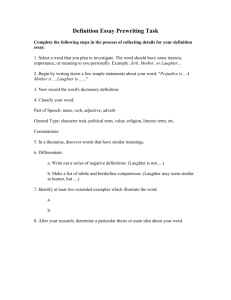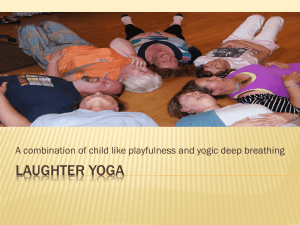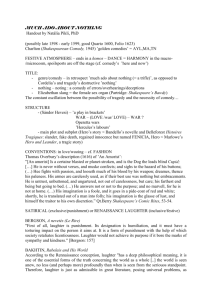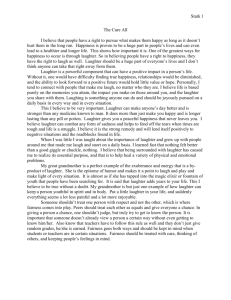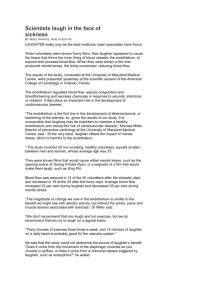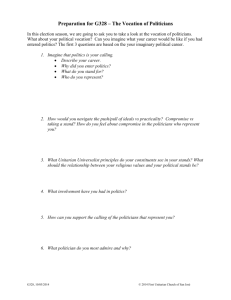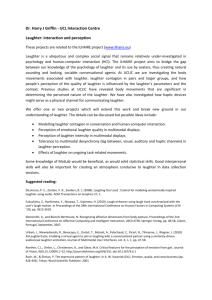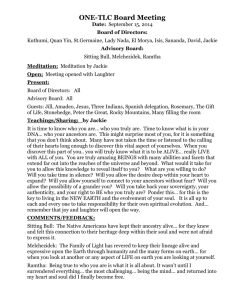transcripts - Trinity Western University
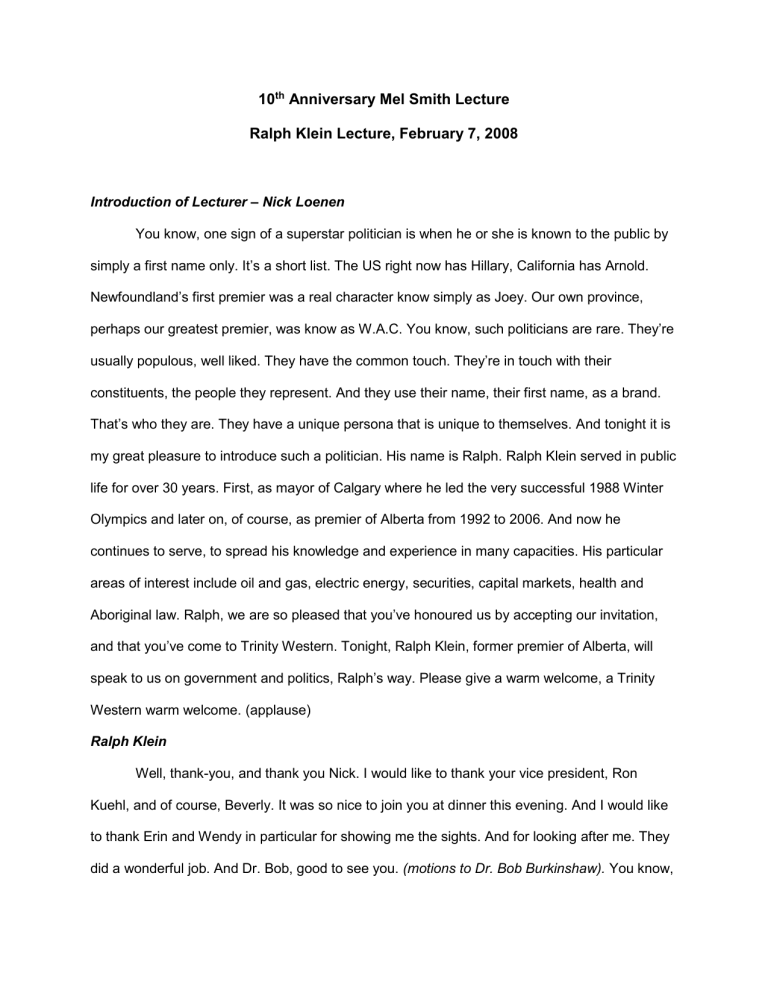
10
th
Anniversary Mel Smith Lecture
Ralph Klein Lecture, February 7, 2008
Introduction of Lecturer – Nick Loenen
You know, one sign of a superstar politician is when he or she is known to the public by simply a first name only. It’s a short list. The US right now has Hillary, California has Arnold.
Newfoundland’s first premier was a real character know simply as Joey. Our own province, perhaps our greatest premier, was know as W.A.C. You know, such politicians are rare. They’re usual ly populous, well liked. They have the common touch. They’re in touch with their constituents, the people they represent. And they use their name, their first name, as a brand.
That’s who they are. They have a unique persona that is unique to themselves. And tonight it is my great pleasure to introduce such a politician. His name is Ralph. Ralph Klein served in public life for over 30 years. First, as mayor of Calgary where he led the very successful 1988 Winter
Olympics and later on, of course, as premier of Alberta from 1992 to 2006. And now he continues to serve, to spread his knowledge and experience in many capacities. His particular areas of interest include oil and gas, electric energy, securities, capital markets, health and
Aboriginal law. Ralph, we are so pleased that you’ve honoured us by accepting our invitation, and that you’ve come to Trinity Western. Tonight, Ralph Klein, former premier of Alberta, will speak to us on government and politics, Ralph’s way. Please give a warm welcome, a Trinity
Western warm welcome. (applause)
Ralph Klein
Well, thank-you, and thank you Nick. I would like to thank your vice president, Ron
Kuehl, and of course, Beverly. It was so nice to join you at dinner this evening. And I would like to thank Erin and Wendy in particular for showing me the sights. And for looking after me. They did a wonderful job. And Dr. Bob, good to see you. (motions to Dr. Bob Burkinshaw).
You know,
I can’t tell you how proud I am to be here at Trinity Western University. In the historic, I learned this for the first time, city of Langley. Now I understand that it’s not the centre of the universe, but it was to be the capital of British Columbia and Fort Langley is a very significant, or played a very significant role in the founding of this p rovince. But I can tell you, it’s great to be here at the university and it’s wonderful to be part of the tenth anniversary of the Mel Smith lectures at
TWU. Now I understand that Mel Smith, notwithstanding the fact that he was a public service employee for 31 years, but he must have collected over four premiers, a phenomenal grasp of and books and writings on constitutional issues. I was talking to Beverly and I asked her if she knew Arisea Lenny who was my sort of guru on international affairs and she was allowed to take notes at one session. And to read the constitutional notes of Mel Smith must be something to behold and I hope that all of the students here take the opportunity to read his writings and his very very private notes on some of the constitutional sessions that undoubtedly he had the opportunity to attend. Because he will provide a unique British Columbia perspective on constitutional and political issues. And I understand that all of his writings will be available to students here at the university and to anyone who is really interested in seeing his phenomenal writings. And I would hope that that includes the students and the scholars at the Woodrow
Wilson Institute.
You know, I spent 3 months in Washington, D.C. at the Woodrow Wilson Centre for scholars. I was the most unscholarly person there (laughter).
You would have enjoyed it- there were more PhDs there than you could shake a stick at (laughter).
So I was assigned to do a paper on Canadian politics. And I did what I thought was a great paper on Canadian politics and
I took it to the director of the Canada Institute and he said no one would be interested. They’re not interested in Canada in Washington on Capital Hill. So I sent it to Nancy Pelosi anyways,
(laughter) who’s the speaker of the House of Congress and I haven’t received a reply yet
(laughter.) But I do find that there is a vast opportunity to teach Americans about Canadian politics. And you know, in listening, and I spend a lot of time, after the first month in Washington,
D.C., after you see all the monuments and you visit the Smithsonian Institute, then you tend to watch a lot of television (laughter) and go to a lot of movies. But the television commentaries and believe me, American politics, it seems to me, is driven by the media. And they talk about three things- they talked about the war in Iraq, they talked about, this is the media- Bob
Contrakie, and Wolf Blitzer of CNN, Contrakie from Fox News, talked about the war in Iraq, the mortgage situation relative to middle America and illegal aliens, mostly from Mexico. And those appeared to be the issues. So I did a paper saying that, notwithstanding what they consider to be the great issues, Canadian politics are not boring (laughter).
You know, we have a huge debate going on over same sex marriage, we have a huge debate going on over the Kyoto
Protocol, and I have some thoughts on that but I won’t pass them along (laughter).
We have a huge debate over the Canadian wheat board. A huge debate over gun registration. All of the things that seem to irk western Canadians. And I find them quite intriguing, to be frank.
I want to take this opportunity to congratulate Donna Robertson (applause).
Donna, congratulations. Now I understand that Donna is a third year- fifth year- fourth year-ok
(laughter).
That’s where I spent the best five years of my life- was in Grade Three (laughter).
But ok, so you’re fifth year- fourth year. Ok, in political studies. And I’m glad that they call it Political
Studies, here at Trinity Western University because, I don’t know, they have this thing called
Political Science and there is no science involved in politics (laughter)!
No science whatsoever!
So I’m glad that they call it political studies and congratulations again.
Now, I want to tell you a little bit about what we did in Alberta. As you know, there is an election going on and I don’t know how well Eddie is going to fare. They call him Steady Eddie.
I, my prediction, and I’m out of politics now, is that he’s going to get a majority but it is going to be reduced. A reduced majority. Perhaps 49 to 50 seats. 48, 47, but he’s in danger of losing some seats. And it has to do with two issues. One is the whole issue of oil royalties especially in the city of Calgary. And the second issue is that he largely ignored the city of Calgary which is a strong conservative base in his appointment of Cabinet ministers. Outside of two ministers, he
appointed at the outset, then he came back and appointed two more. But it was too little too late in the minds of some.
But I’m going to talk about my political experience because that’s all I really can talk about. In 1993, now that goes back before some of you were born, (laughter) there was a very popular, former mayor of Edmonton, who since passed away. His name was Laurence Decore.
And he was leader of the liberal party and the Liberals swept, swept the city of Edmonton.
Redmonton they called it. And the periphery all around the city. And for the first time they took a seat outside of Edmonton. They took one in Lethbridge and they took one in Fort McMurray.
And it was a, the fellow from Lethbridge was a fellow by the name of Ken Nickel, who was a agronomist, a professor at the university of Lethbridge. And the fellow from Fort McMurray was a lawyer, Adam Germain. And the election was all about getting the province’s financial house in order. And getting out of the business of being in business. People, ordinary people, like, I call them the Marthas and Henrys, were tired of hearing about business losses and the province having the highest per capita spending of any province in Canada. And we owned everything.
You name it, we owned it. We had oil companies, we had airline companies, we had telephone companies. We had cookie companies, we had magnesium plants, we had everything. You name it, we owned it! We had everything and unfortunately, the newspapers only report the failures. They never report the successes, only the failures, the crashes. As a matter of fact, I’ve often said that 200, 000 planes take off and land safely everyday. And have one crash, and of course it will make the headlines. That’s the nature of the beast.
The financial review commission. This was a commission that I appointed of good thinking private sector people who had access to all the books of the government. All the books of the government were wide open to this group of private citizens. And they came back with three recommendations. They said you don’t have a revenue problem, you have a spending problem. They said, “Get out of the business of being in business. You know nothing about business. You’re not business people- you’re politicians.” And they said, “and your pension
plans are gold plated, so do something about your pension plans.” Well, that report helped me immensely.
The election v ictory was called a miracle on the prairies. I believe that it wasn’t a miracle at all. It was about finding out where the parade was headed, and then getting to the front of the parade (laughter).
Without doubt, ordinary Albertans were mad, but they were willing to give the
Progressive Conservative Party another chance. We won by the skin of our teeth- 53 seats. But it was enough to form the government. The only thing that we did, we actually did as we said we were going to do. So after to election of 1993, and by the way Laurence lost that election, not on the issue of finances, but he got sidetracked. You know, we had this discussion at dinner tonight. He got sidetracked on the issue of abortion and that’s what killed him. You know, I was asked that question tonight and I said that those issues kill politicians and somehow they should be kept separate. So, he lost on the abortion issue, but I can tell you that we did as we said we were going to do. Welfare rolls were cut in half, able-bodied people, those who could work but who wanted to remain on welfare, were either cut off or given one way tickets, one way tickets to other jurisdictions (laughter).
Those who wanted to stay and those who were committed to working, the philosophy was a hand up, rather than a hand-out. Those who were sick and disabled in society, we looked after. But those who were able bodied and wanted to stay and wanted to get off the welfare rolls were given job opportunities or the chance to take job retraining or skills upgrading.
No w, all public servant’s wages, including those of the MLAs were rolled back by 5%. All businesses, save for the Alberta Treasury Branch, and I’ll talk about that just for a second. That is the bank of Alberta, and the farmers love it and politically you ca n’t get out of it. But all businesses, save for the Alberta Treasury Branches were sold, and some at fire sale prices. So we got out of the business of being in business. Policies were adopted, no increases in taxes, no loans, no loan guarantees, no tax incentives or economic incentives of any kind. As a matter of fact, we legislated that. The public service was reduced from thirty thousand to twenty
thousand employees. The government did the un-Canadian thing by privatizing liqueur stores.
They said, “Oh my God, that is so un-Canadian, you’ll have drunks on every corner.” Then we went one step further by franchising all government services, like Motor Vehicle licensing and marriage certificates. And people from other jurisdictions said that is the most un-Canadian thing you can do! My God, it is everyone’s god-given right to take an afternoon off work, line up at the motor vehicles branch, take a number only to be told come back tomorrow, your documentation is not in order (laughter).
The paving and maintenance of all highways was privatized. Schools boards were reduced from 180 to just over 60. Some of those school boards didn’t even have schools (laughter) !Hospitals boards were reduced from over 200 to less than 9.
So, it was a revolution. Some people called it that. Some people, like teachers and nurses and some public service employees didn’t like it. Didn’t like it one bit. And they resigned.
But through it all, there were some lessons that were learned. The lessons that were learned were simple. Be honest. Even if it hurts. You know, the media and those in media studies will tell you that, have ways of tracing statements to bring back lies or half truths. There’s no problem with admitting mistakes. Never a problem with admitting mistakes. I’ve admitted many, many mistakes, and I’ve always been called Ralph.
Always anticipate reaction. It’s not what a politician says that makes a story. Although he or she might think that the announcement is significant, the most significant thing in the world.
It’s the reaction to the statement that makes the story. Reaction from a political scientist
(laughter).
Right. Or we tell it, we call it a talking egg-head (laughter).
Or the opposition. Then if a reporter gets reaction to the reaction, or better still a reaction to the reaction to the reaction, then the story has legs. Right, it carries itself. The reporter will have achieved the 5 C’s of journalism. Those 5 Cs are: confusion, chaos, conflict, controversy and confrontation. Those are things that make a story.
Und erstand politics. That’s why I said that’s it’s good that you’re involved in political studies, rather than political science. While many politicians run to make a difference, and to introduce
legislation, or to develop policy, practical politics, unfortunately, is not about policy development.
For the most part, it is about reaction. 99% of issues that are dealt with by government, by politicians are reactive, or steps that need to be taken to put out brush fires. Most, I would say about 99% of all meetings with individuals or groups are about a request for money and the ability to say no and mean it. Or, to change ways things are done by government. Very seldom, if at all, do people offer to do something for the province or the country.
Don’t be afraid to take chances. This is my advice to politicians- don’t be afraid to take chances. You know, I believe the face of Canadian politics was changed as I mentioned earlier, steps were taken that were deemed to be un-Canadian. Like, well, first, eliminating the deficit and the debt. That was deemed to be un-Canadian, because all governments operated with deficits and debt. That was deemed to be un-Canadian because all governments, world wide, operated with deficit and debt. The privatisation of various government services was deemed to be un-Canadian, because government was expected to be involved in the business of being in business. They were expected to spur on business by offering loans and loan guarantees and grants and other financial incentives. Now, all of these policies resulted in protest. Between
1993 and 1996, I can say that my day was not complete without a protest or two, or three. The only thing that kept me going were ordinary Albertans. In church basements and community halls throughout the provin ce. They would say to me, “Never mind the protestors outside. Don’t blink, stay the rails, you’re on the right track.” So, this was indeed the case of a 15-second sound bite created reaction and reaction to the reaction. Not only in Alberta, but across the country for years. So the lesson I learned, and I’ve repeated it, and it’s not what you say that makes a story it ’s the reaction to the story.
Another significant event that occurred during the third mandate, and you have to remember, I was the premier for 14 years, was in July of 2002, the then-finance minister and provincial treasurer, Pat Nelson announced that the 23 billion dollar provincial debt had been eliminated and that the province would generate surpluses in the billions of dollars in the
subsequent years. So, a 15-second sound bite as I mentioned earlier, that sound bite- I am going to eliminate the deficit, I am going to pay down the debt, I am going to lower taxes and I am going to get out of the business of getting in business, that’s a good 15-second sound bite.
The only difference between that conventional politics and the Alberta way is that we actually did as we said we were going to do. That 15 second sound bite got a lot of reaction. As a matter of fact, I can remember, this is anecdotal, a women writing a letter to the newspaper, I forget wh ether it was the Calgary Herald or the Edmonton Journal, saying, “For God’s sake Ralph, quit, quit, quit. Quit with the cuts, quit with everything and we’ll forgive you, because we’re so used to pol iticians not keeping their word that we’ll forgive you.” So the only difference between conventional politics and the Alberta way is we actually did as we said we were going to do.
Now, I’m going to leave you with one final thought. This is some advice to politicians.
Most, if not all legislatures, well except for the national capital, it has a tower, but most legislatures have domes. That refers to the national capital in Washington DC. It has a huge dome. I refer to dome disease as a disease of the legislature whereby you start to think that the most important thing in the world happens under the dome. It happens either under the dome in the nation’s capital or in the legislatures. When you start to believe what the opposition, the media, the bureaucracy, and members of your own caucus say is the absolute truth, then you have dome disease (laughter).
It’s only when you get out and about, do you find that ordinary people, the Marthas and the Henrys, the Mr. and Mrs. Grundys, of the world have different pri orities altogether. They’re talking about, oh building a new hockey rink, they’re talking about the secondary highway, they’re talking about basic things that affect them on a day to day basis.
My advice to my caucus was to get out from under the dome, avoid catching that terrible disease called dome disease and find out what the real people are thinking. Thank you so much.
